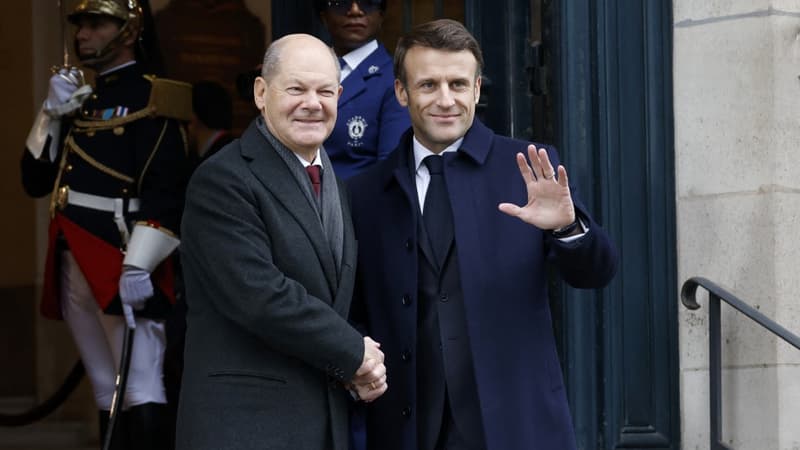After the deployment of disputes, the attempt to reactivate: Emmanuel Macron receives Olaf Scholz in Paris this Sunday to show a certain unity found, on the occasion of the solemn 60th anniversary of the reconciliation treaty between Germany and France. After a ceremony at the Sorbonne at 11:00 a.m., the French president and the German chancellor will meet at midday at the Élysée for a Franco-German council of ministers.
In October, this annual meeting had to be postponed due to disagreements on a number of key issues, from energy to defense. As a result, the meeting between the first two powers of the European Union will this time be closely scrutinized to detect their degree of agreement.
A call to invest in European armies
The date of the reunion is highly symbolic: sixty years after the signing of the Élysée Treaty by Charles de Gaulle and Konrad Adenauer, which “marked the end of decades, if not centuries, of fierce rivalries and bloody wars,” write the two leaders. in a column published by the newspaper Frankfurter Allgemeine Zeitung and the Sunday newspaper.
Although the war has returned to the continent for eleven months, Olaf Scholz and Emmanuel Macron have affirmed their wish that “Europe becomes even more sovereign”, investing more in defense and adopting “a strategy that strengthens European industrial competitiveness”.
In terms of defense, although the Future Air Combat System (FAS) has advanced recently, missile defense continues to be a stumbling block: Berlin is promoting a shield project that includes an Israeli component to which 14 European countries want to join, while Paris is working in its own system, with Italy, in the name of Europe’s “strategic autonomy”.
The two neighbors must try to agree on European reforms to curb the rise in energy prices linked, in particular, to the war in Ukraine, and present joint projects in terms of innovation. A train ticket designed to encourage young people to travel between the two countries will also be launched.
Heavy tanks for Kyiv?
The two leaders could also discuss sending heavy tanks to Kyiv, which is facing Berlin’s reluctance to hand over its Leopard tanks.
“We are going to be in the initiative,” launched on Saturday the deputy of the French presidential party Benjamin Haddad, advocating the sending by France of a “limited number of Leclerc tanks to create a dynamic.”
In the Élysée as in the chancellery, we refuse in any case to dramatize the crisis within the tandem. A French diplomatic source points out that the government is now refraining from speaking of a Franco-German “couple”, a term in too emotional a register. “It is not a romantic love but a real political responsibility,” says a German diplomatic source.
Therefore, the two allies approach this new stage realistically, even if a smell of misunderstanding has floated between them since Olaf Scholz succeeded Angela Merkel at the end of 2021, each annoyed by the initiatives taken by the other without prior consultation. .
Source: BFM TV


